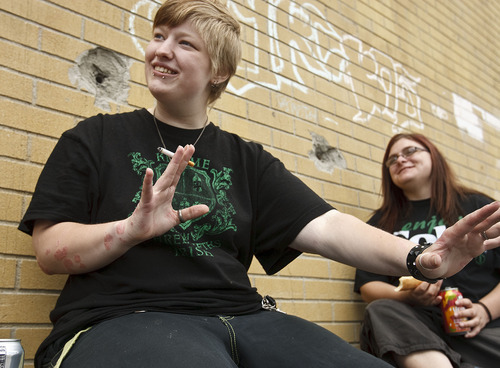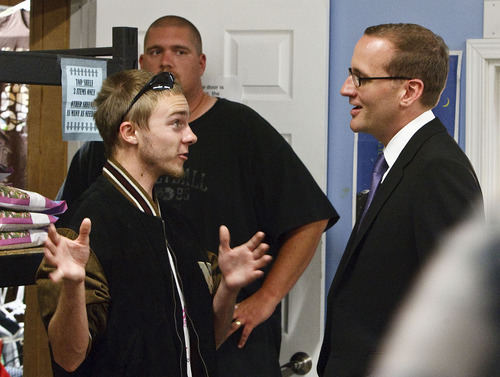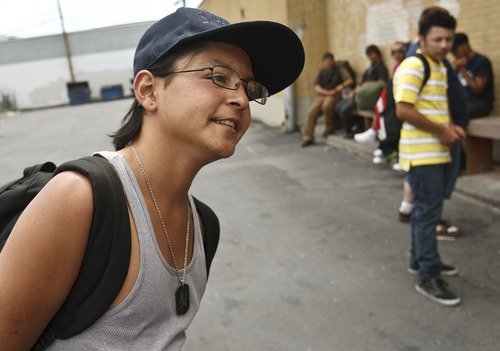This is an archived article that was published on sltrib.com in 2012, and information in the article may be outdated. It is provided only for personal research purposes and may not be reprinted.
Autumn "Audo" Saunders always knew she was attracted to other females but didn't break the news that she was a lesbian to her father until age 17.
He called her a liar at first, then shipped her off to a Christian camp in New York, where counselors tried to convince her that she could choose to be straight.
"They put me in skirts," laughed the now-20-year-old, who prefers her current style of short hair, piercings and baggy shorts. "That might have been the scariest part."
When the "therapy" didn't work, Saunders was kicked out of camp. As she left, counselors told her she was "hopeless," adding she would burn in hell because of her sexual orientation.
Since then, Saunders has bounced around between Utah, Michigan and Minnesota, trying to heal from her father's hurtful rejection while figuring out how to create a new life for herself with her girlfriend of two months.
It hasn't been easy: Saunders has slept in parking garages, behind Dumpsters and in the stairwells of apartment complexes while navigating life on the streets.
Life improved when she found the Volunteers of America Utah Youth Homeless Drop-In Center in downtown Salt Lake City. There, she has found needed support in searching for housing and obtaining health care for psoriasis, a condition that causes her skin to itch and flake.
But more importantly, at the center she found a community that accepted her.
"I don't have to worry about anyone dissing my sexuality here," she said. "It's nice."
Cases like Saunders are happening more frequently in Utah, civil rights officials representing the gay, lesbian, bisexual and transgender communities said Saturday during an event organized to increase awareness of issues facing Utah's LGBT youths.
Chad Griffin, the new president of the Washington, D.C.-based civil rights group the Human Rights Campaign, visited the center along with civil rights icon Julian Bond; Utah philanthropist and businessman Bruce Bastian; Utah Pride Center Executive Director Valerie Larabee; Equality Utah Executive Director Brandie Balken and Volunteers of America executives Kathy Bray and Zach Bale.
The group wanted to highlight the struggles of LGBT youths in Utah on the heels of a new national report released by the Human Rights Campaign called "Growing up LGBT in America," which contains startling revelations about the state of mind of LGBT youths.
The survey, released last week, is considered to be one of the largest ever to focus on LGBT youths in the United States.
Conducted online, the survey involved 10,030 participants ages 13 to 17 who identified as LGBT. It compared their responses to interviews with 500 13- to 17-year-olds who identified themselves as straight.
The survey reveals that LGBT youths are less likely to be happy, more likely to experience harassment and more likely to experiment with drugs and alcohol than their straight counterparts.
"It really shows us their lives," said Griffin. "Though there certainly are some optimistic things, the numbers are quite sobering. It should serve as a wake-up call to adults across this state."
Utah LGBT youths were on par with their peers nationally on some topics: 37 percent reported they were happy; 92 percent said they had heard negative messages about being LGBT; and 79 percent reported they heard positive messages about being LGBT.
But 69 percent of Utah youths reported being harassed with slurs such as "fag," while only 53 percent nationally said they had been a victim of such behavior.
And 69 percent of Utah LGBT teens said their communities are not accepting of their sexual orientation, much higher than the 42 percent nationally who reported feeling that way. Seventy-four percent of Utah youths said area churches are not accepting of the LGBT community, while the national number was 57 percent.
Utah's numbers are troubling, said Bastian, because it shows many LGBT youths feel alone.
"The sad thing to me is that so many young people feel alone in their struggle; that so many people feel like there is no place for them," said Bastian.
"These kids need to at least have hope. They need to have knowledge and comfort that there are people on their side."
Bale noted that the homeless youth center serves an average of 65 people a day, up from an average of 25 people a day five years ago.
Many youths who frequent the center have ended up on the streets for a variety of reasons, but a large number are LGBT youths kicked out of their houses because of their sexual orientation, he said.
"When you look at the different reasons why youth are on the street, certainly physical and sexual abuse is one of the leading causes," said Bale. "Foster care, economic factors at the home ... but then really coming down to it, [there are] youth who were kicked out of their home because they came out.
"There is no reason that youth should be on the street," Bale said. "As parents, as guardians, we have a responsibility to first and foremost provide the right of a safe place of shelter, of comfort. We have many youth in our community that aren't provided that by those who are supposed to protect them."
Saunders said she's grateful the center is helping her find an apartment and plan for the future.
She still grapples with the hateful remarks from her father. She last saw him a year ago when he told her that as a "fatherly duty" he needed to tell her that she was bound for hell because she is a lesbian. She said meeting other youths at the center who have had experiences similar to her own has been helpful.
"If it weren't for this place, I wouldn't have a lot of the friends I have," she said.
More online
O Watch a video of Human Rights Campaign's Chad Griffin as he speaks about LGBT youth.
> bit.ly/NpoZYP







